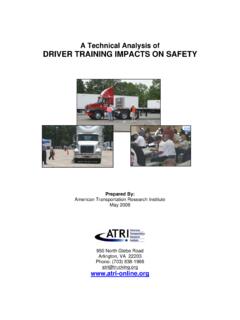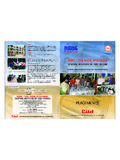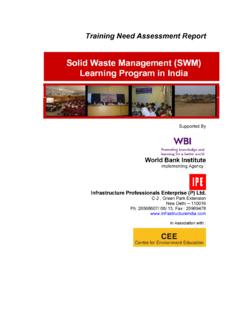Transcription of INVESTIGATION AND PROSECUTION OF …
1 INVESTIGATION AND PROSECUTION OF corruption offences : MATERIALS FOR THE training COURSE 2012 2 This work is published on the responsibility of the Secretary-General of the OECD. The opinions expressed and arguments employed herein do not necessarily reflect the official views of the Organisation or of the governments of its member countries. This document and any map included herein are without prejudice to the status of or sovereignty over any territory, to the delimitation of international frontiers and boundaries and to the name of any territory, city or area. OECD 2012 3 FOREWORD Fighting corruption and promoting good governance are among the main priorities of the OECD. The OECD has established anti- corruption standards and good governance principles, and has promoted their implementation by member countries through mutual reviews and elaboration of good practices.
2 It also helps non-members to improve their domestic anti- corruption and good governance efforts by sharing of experience and analysis through regional programmes. The Anti- corruption Network for Eastern Europe and Central Asia (ACN) is one such regional anti- corruption programme ( ); over the decade it has been the main vehicle for promoting OECD standards and supporting anti- corruption programmes in this region. The OECD/ACN project Strengthening the Capacity for INVESTIGATION and PROSECUTION of corruption in Ukraine (OECD/ACN Project for Ukraine) aims to support national reforms, and focuses at promoting institutional and professional specialization in anti- corruption in Ukrainian law-enforcement system. To achieve this objective, the project pursues several activities, including strengthening professional capacity of investigators and prosecutors necessary to detect, investigate and prosecute corruption related crimes.
3 This manual was developed as a part of such efforts and is aimed for the primary use of the National Academy of Prosecutors of Ukraine. But it can also be useful for other teachers, professors and trainers who deliver academic education to university students and in-service training for operating investigators and prosecutors in Ukraine, and possibly in other countries with similar background conditions. The manual covers all stages of INVESTIGATION and PROSECUTION of corruption cases and methods which can be applied by law-enforcement officers based on the Ukrainian legislation currently in force, as well as methods which could be recommended based on the best international and European practice. It consists of the following main parts: 1. International standards and Ukrainian laws on INVESTIGATION and PROSECUTION of corruption . 2. Practical guidelines for INVESTIGATION and PROSECUTION of corruption in Ukraine.
4 3. methodology and description of the training course for teachers. 4. CD Rom with training materials for students and for teachers. The manual was prepared jointly by the OECD/ACN Project for Ukraine, Basel Institute on Governance, Ukrainian National Prosecutor s Academy, and in co-operation with the Council of Europe/European Commission Support to Good Governance: Project against corruption in Ukraine (UPAC). The OECD/ACN Project for Ukraine is funded by the Department of State of the United States of America. 4 TABLE OF CONTENTS FOREWORD 3 ACKNOWLEDGEMENTS 7 EXECUTIVE SUMMARY 8 1. INTERNATIONAL STANDARDS, GOOD PRACTICE AND UKRAINIAN LEGISLATION 9 corruption offences 9 International Standards 9 Liability for corruption offences in Ukraine 9 Criminal liability 10 Administrative Liability 10 Sanctions, Confiscation and Immunities 11 Continued Legal Reform 11 Principles of PROSECUTION and INVESTIGATION of corruption cases 12 Role of the prosecutor 12 Mandatory versus discretionary PROSECUTION 12 Independence 13 Specialisation 14 Resources 15 2.
5 PRACTICAL GUIDELINES ON INVESTIGATION AND PROSECUTION OF corruption CRIMES 16 Instituting criminal proceedings 16 Sources of information to institute criminal proceedings 16 Grounds for instituting criminal proceedings 16 Treatment of anonymous reports 17 Verification of the crime reports 17 Decision on instituting criminal proceedings 18 Instituting criminal proceedings against persons with immunity 18 Criteria to prioritise cases 18 Qualification of criminal offences 19 Qualification of the corruption offences 19 corruption related offences 20 Gathering and use of evidence 21 INVESTIGATION plan and allocation of resources 21 Identifying potential targets 21 Developing investigative theory 21 Choosing investigative methods 21 Ensuring adequate resources for the case 21 Proactive INVESTIGATION strategies 22 Investigative techniques 23 Special investigative techniques 23 Financial investigations 25 Analysis of a specific payment 25 5 Analysis of income and expenditures 25 Analysis of fraudulent financial transactions 26 Involvement of specialized experts during INVESTIGATION 26 Forensic accounting expertise 26 Protection of witnesses, collaborators of justice and whistleblowers 27 Freezing, seizure and confiscation 29 Laying charges, presenting and supporting the case in court 30 Direct versus indirect or circumstantial evidence 30 Sources of indirect evidence 30 How to involve forensic accountants at a trial stage 31 International co-operation 31 Mutual legal assistance 31 Legal basis for mutual legal assistance 31 How to obtain mutual legal assistance 32 Extradition 33 Asset recovery 33 Informal co-operation and Joint Investigative Teams 34 3.
6 training COURSE 36 training methodology 36 Overview of the training course components 36 Introduction 36 36 excercise 37 Evaluation 38 training plan 38 training materials 39 Evaluation 39 Lectures 41 Lecture 1 corruption offences : Overview of International Standards and National Legislation 41 Lecture 2 Elements of the offences 55 Workshop on elements of the corruption offences 64 Lecture 3 Money Laundering 65 Lecture 4 Financial investigative techniques and evidentiary requirements 73 Workshop on financial investigations 84 Lecture 5 Use of electronic tools in financial investigations 86 Lecture 6 International cooperation in investigating and prosecuting corruption 90 Practical Exercise 103 Preparation for the practical exercise 103 Materials for the practical expercise 103 How to remove the passwords 104 How to keep track of the handouts/leads 104 How to use Investigative File Inventory (IFI) 104 Setting rules of the practical exercise 105 Conduct of the practical exercise 105 Exercise Part 1 105 Exercise Part 2 107 Exercise Part 3 108 Exercise Part 4 108 6 Exercise Part 5 109 Exercise Part 6 109 Exercise Part 7 110 Exercise Part 8 111 Exercise Part 9 112 Exercise Part 10 113 Exercise Part 11 114 Exercise Part 12 114 Exercise Part 13 115 CD ROM 117 7 ACKNOWLEDGEMENTS This publication is the result of joint work by the OECD Anti- corruption Network for Eastern Europe and Central Asia (ACN), the Council of Europe/European Commission Support to Good Governance: Project against corruption in Ukraine (UPAC), Ukrainian National Prosecutor s Academy, and the Basel Institute on Governance.
7 Tom Lasich, Phyllis Atkins and Pedro Pereira from Basel Institute on Governance authored the core substantative part of the manual with contributions from Ukrainian experts: Vitaliy Kasko, Oleksandr Kovalenko, Liudmyla Ilkovets and Sergiy Chernoy. The preparation of the manual was co-ordinated by Tanya Khavanska of the OECD/ACN Secretariat. Olga Savran, Inese Gaika and Dmytro Kotliar of the OECD/ACN Secretariat contributed to various sections of the publication. The OECD Secretariat would like to thank the Department of State of the United States of America for their financial support provided through the Project Strengthening the Capacity for INVESTIGATION and PROSECUTION of corruption in Ukraine . 8 EXECUTIVE SUMMARY This Manual was developed for the use of the National Academy of Prosecutors of Ukraine which is the main body which provides professional training and development for prosecutors.
8 But it can also be useful for other teachers, professors and trainers who deliver academic education to university students and in-service training for operating investigators and prosecutors in Ukraine, and possibly in other countries with similar background conditions. It consists of three parts. The first part of the Manual provides an overview of international standards in the field of criminal liability for corruption and good practice regarding the role of prosecutors in investigating and prosecuting corruption offences . It provides a brief analysis of the Ukrainian legislation and clarifies which elements already comply with the international standards and best practice, and areas where further reforms are still needed. This analysis will inform Ukrainian investigators and prosecutors about current possibilities provided by the Ukrainian legislation, and about changes that may be expected as a result of ongoing reforms, to which they may want to prepare.
9 The second part of the Manual presents methods that can be used by investigators and prosecutors in criminal proceedings in corruption -related crimes. These methods are provided for each stage of INVESTIGATION and PROSECUTION , from initiating the proceedings and qualification of offences to gathering evidence, laying charges and presenting the case in court. Special attention is given to the use of special investigative techniques and financial investigations. Instruments of international co-operation in the INVESTIGATION and PROSECUTION of corruption offences are also presented in this part. This part includes methods provided by the existing legal system and tradition in Ukraine, as well as tools which are not yet available in Ukraine, but can be recommended on the basis of international standards and good practice from other countries. The third part of the manual is intended for teachers who deliver training on INVESTIGATION and PROSECUTION of corruption offences .
10 It includes description of the training methodology , which combines lectures and practical exercises based on a case study, a training plan and guidance on the use of the training materials. It further provides a set of lectures, which can be used by teachers in the delivery of this training . Finally, this part provides description of the practical exercises and the case study. All training materials, including additional reference materials and materials for the practical exercise are provided on the attached CD-ROM. They are organized in two folders; one is for the use of teachers and one is for the use of students. 9 1. INTERNATIONAL STANDARDS, GOOD PRACTICE AND UKRAINIAN LEGISLATION The first part of the Manual provides an overview of international standards in the field of criminal liability for corruption and good practice regarding the role of prosecutors in investigating and prosecuting corruption offences .



















